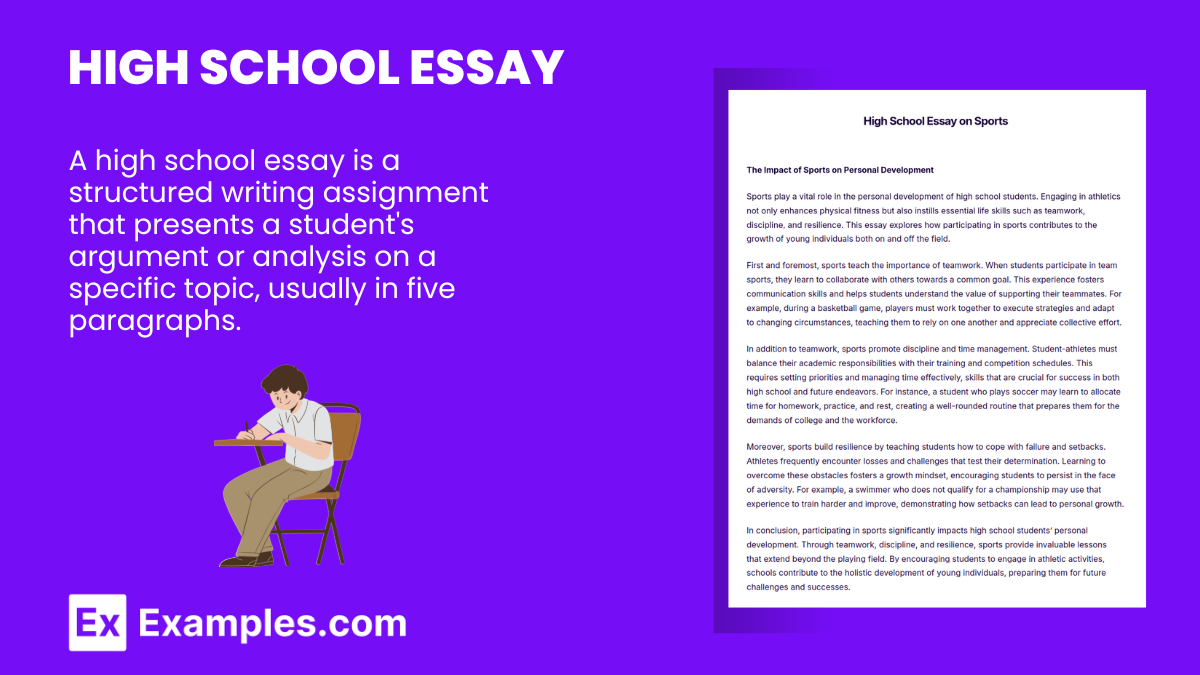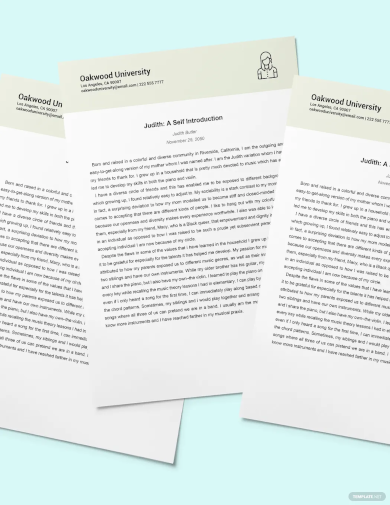14+ High School Essay Examples to Download
Navigating the complexities of High School Essay writing can be a challenging yet rewarding experience. Our guide, infused with diverse essay examples, is designed to simplify this journey for students. High school essays are a crucial part of academic development, allowing students to express their thoughts, arguments, and creativity. With our examples, students learn to structure their essays effectively, develop strong thesis statements, and convey their ideas with clarity and confidence, paving the way for academic success.
It is a good way to practice every student’s writing skills in writing which they might find useful when they reach college. Others might even be inspired to continue writing and take courses that are related to it.
When you are in high school, it is definite that you are expected to do some write-ups and projects which require pen and paper. Yes. You heard that right. Your teachers are going to let you write a lot of things starting from short stories to other things like expository essays. However, do not be intimidated nor fear the things that I have just said. It is but a normal part of being a student to write things. Well, take it from me. As far as I can recall, I may have written about a hundred essays during my entire high school years or maybe more. You may also see what are the parts of an essay?
What is High School Essay?
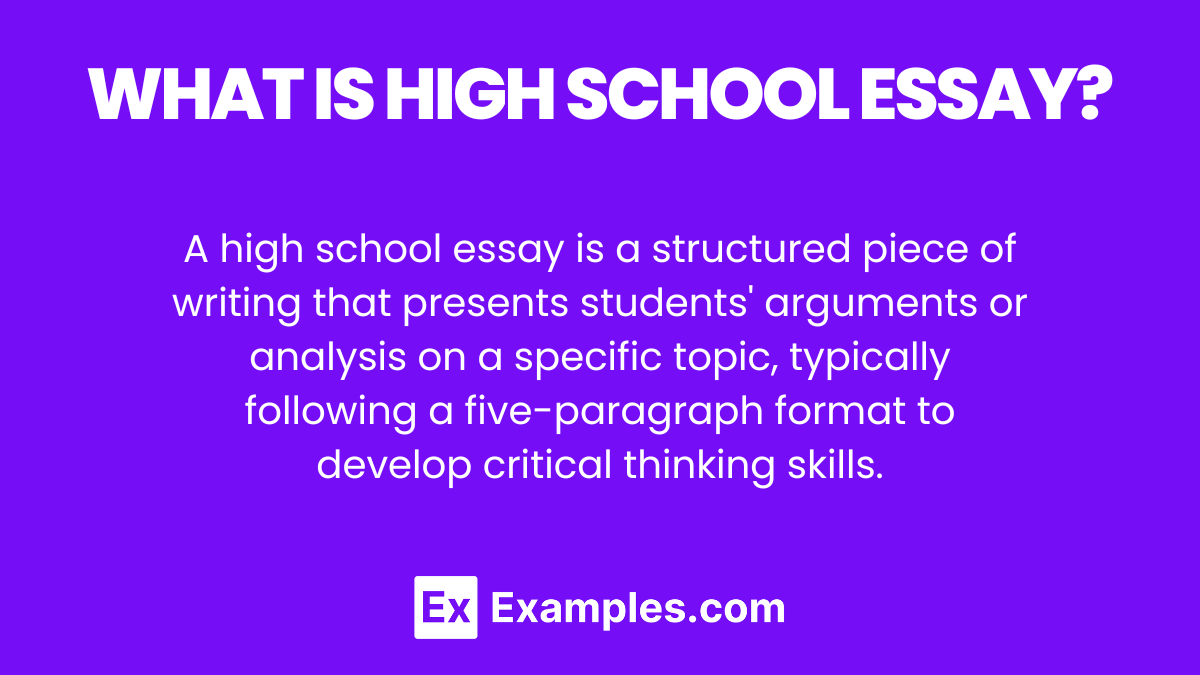
High School Essay Bundle
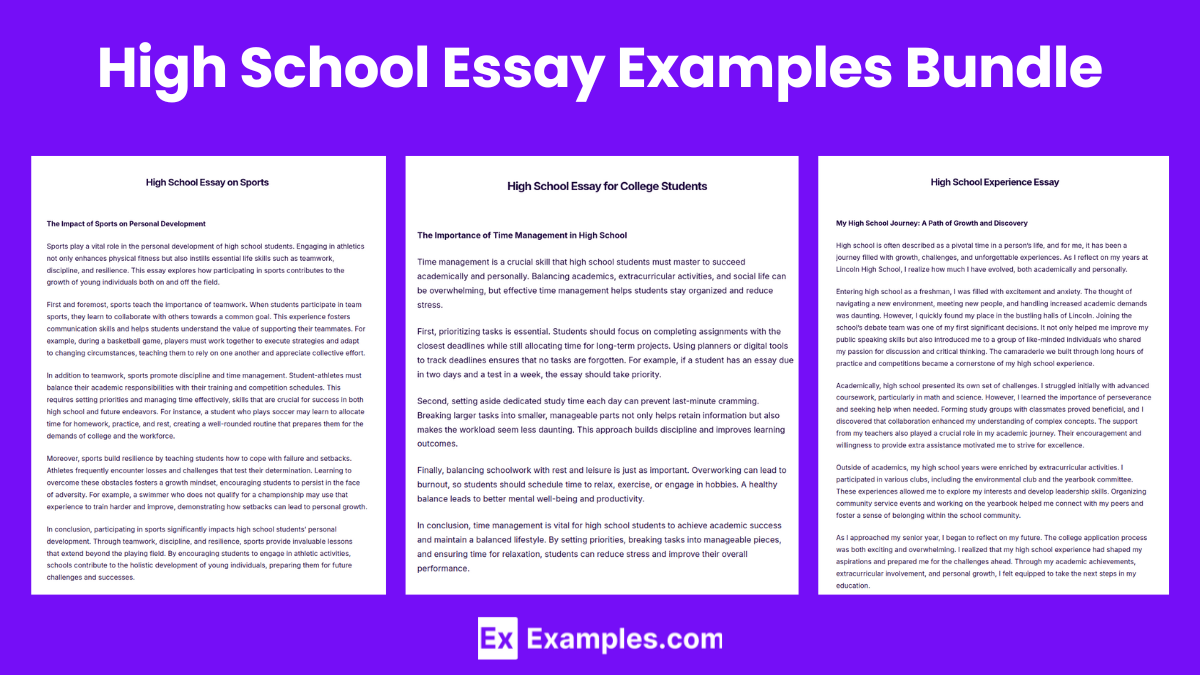
Download High School Essay Bundle
High School Essay Format
Opening Remarks
Greeting: Start with a warm and respectful greeting to address the audience and set a positive tone.
Introduction: Briefly introduce the purpose of your essay, outlining what you intend to discuss or explore. Be clear and direct, allowing your readers to understand the direction of your argument.
Body of the Essay
Purpose: Explain the main objective of the essay. Clarify the topic being discussed and why it is important or relevant to your audience. Keep the introduction concise while ensuring it captures attention.
Acknowledgments
Key Figures: Recognize any important figures, events, or ideas that play a significant role in the essay. This could be historical figures, concepts from literature, or notable advancements in the topic you are covering.
Supporting Details: Provide in-depth analysis of the key points. Each paragraph should focus on one specific idea, supported by evidence such as facts, examples, or quotes.
Counterarguments: Acknowledge differing opinions or perspectives. Present these viewpoints and explain why your argument remains valid or superior.
Additional Insights: Introduce any relevant contributions from experts or key findings that reinforce your main argument. Offer further discussion on how these points add depth to the topic.
Closing Remarks
Summarize: Recap the essential points discussed in the essay. Reiterate your argument or thesis, ensuring that it ties together all the evidence and ideas you have presented.
Final Thoughts: Offer concluding thoughts that reflect on the broader significance of your topic. Leave the reader with something to think about, perhaps posing a question or suggesting future areas of exploration.
Farewell: End with a respectful closure, reinforcing the purpose of your essay and its overall message, ensuring that the reader feels the argument has been effectively concluded.
High School Essay Example
The Importance of Education in Shaping the Future
Education is often regarded as the cornerstone of personal and societal growth. It plays a crucial role in equipping individuals with the knowledge, skills, and values necessary to navigate an increasingly complex world. While it is widely acknowledged that education helps people to pursue their professional goals, its impact extends far beyond career preparation. It shapes individuals’ character, fosters critical thinking, and encourages responsible citizenship, all of which contribute to building a better future.
One of the key ways education shapes the future is through the development of critical thinking skills. In a world filled with information, individuals must be able to analyze, evaluate, and synthesize knowledge effectively. Education empowers students to ask questions, challenge assumptions, and approach problems from multiple perspectives. This ability to think critically is essential not only in academic settings but also in everyday life. For example, in a democratic society, an educated population is better equipped to make informed decisions about political matters, understand global issues, and engage in meaningful discussions.
Moreover, education promotes social responsibility and ethical behavior. Schools do not just teach academic subjects; they also play a significant role in instilling values such as integrity, respect, and empathy. These values are fundamental in fostering a harmonious society. Through education, students learn the importance of working together, appreciating diversity, and contributing to the welfare of their communities. By shaping the moral compass of future generations, education ensures that people are not only knowledgeable but also kind, compassionate, and committed to the greater good.
In addition to personal growth, education also drives societal progress. It has the power to break cycles of poverty, improve public health, and promote economic development. In many countries, access to education has been a critical factor in reducing inequality and promoting social mobility. By investing in education, societies can cultivate a skilled workforce that drives innovation and economic growth. Furthermore, educated citizens are more likely to engage in civic activities, volunteer for community service, and participate in the democratic process, thereby strengthening the social fabric.
While education offers numerous benefits, challenges such as unequal access to quality education persist. Many students around the world still face barriers such as poverty, discrimination, and lack of resources. Addressing these challenges requires concerted efforts from governments, organizations, and communities to ensure that every individual, regardless of background, has the opportunity to receive a high-quality education. By doing so, we can create a more equitable and prosperous world for future generations.
Short High School Essay
Why Education Matters
Education is vital for personal growth and the development of society. It provides the foundation for acquiring knowledge, skills, and values that help individuals succeed in life. Through education, people learn to think critically, solve problems, and make informed decisions. These abilities are essential in today’s fast-paced and ever-changing world.
Beyond academics, education instills important life values such as respect, responsibility, and empathy. Schools not only teach facts but also shape students’ character, preparing them to be productive and ethical members of society. Education also drives economic and social progress, as it opens doors to better job opportunities and helps reduce inequality.
While access to quality education remains a challenge for many, it is a crucial investment in both individual success and societal advancement. Ultimately, education empowers people to create a brighter future for themselves and their communities.
High School Essay for College Students
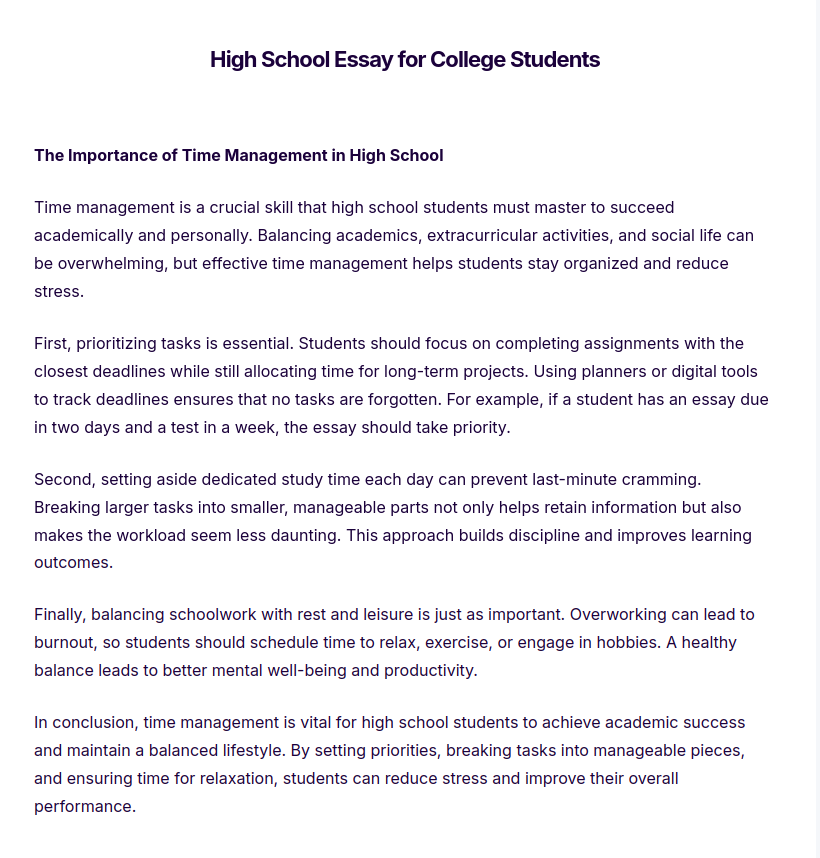
High School Essay on Sports
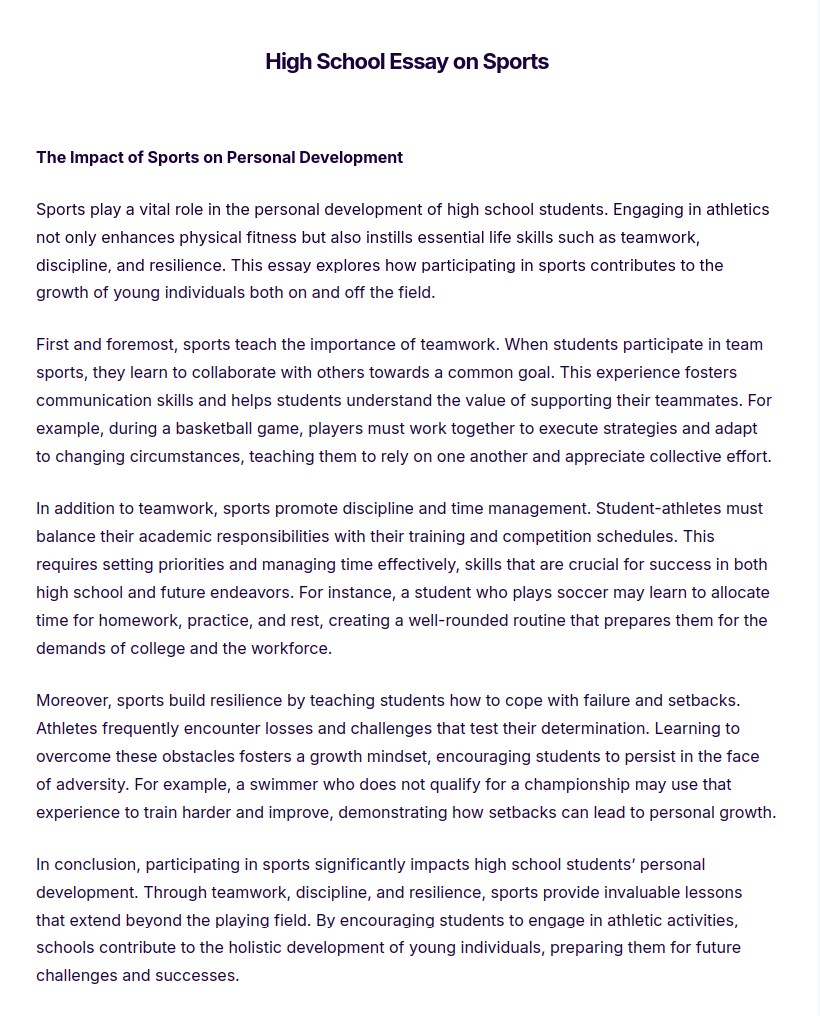
High School Experience Essay
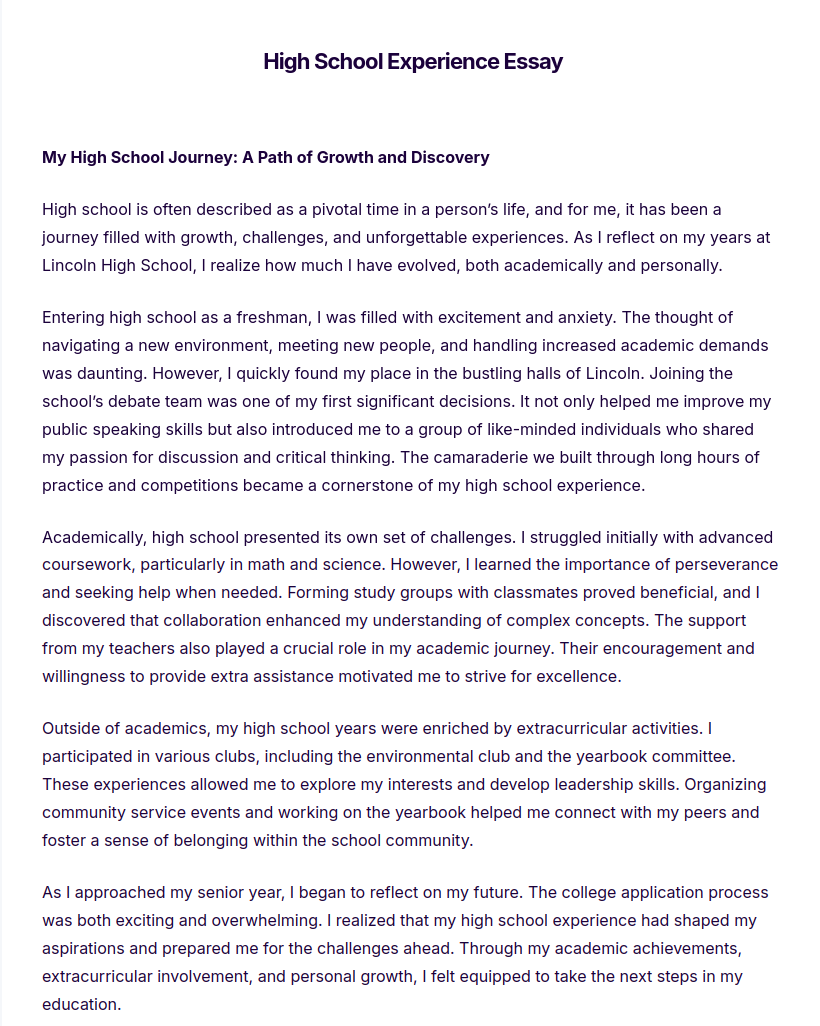
More High School Essay Examples and Samples
High School Essay Examples & Templates
High School Self Introduction Essay Template
Sample High School Essay

Reflective High School Essay
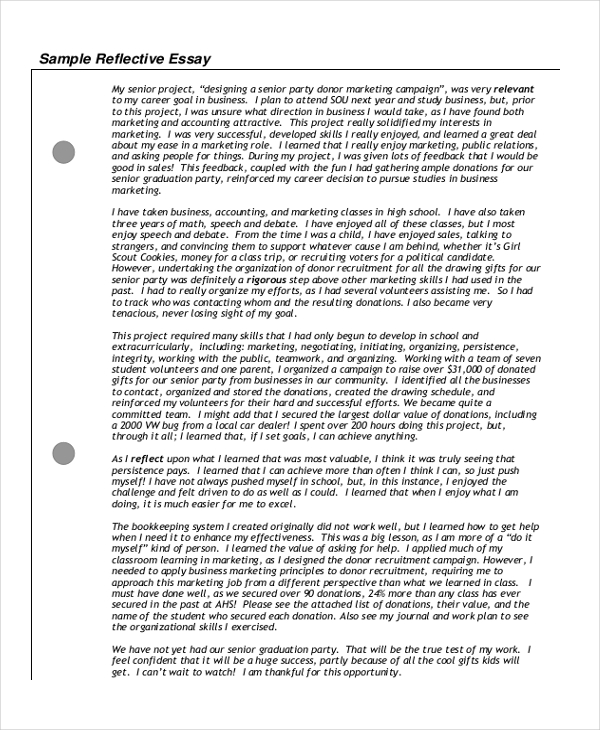
How to Write High School Essay?
Writing a high school essay involves clear structure, logical flow, and proper argumentation. Here’s a step-by-step guide:
Understand the Assignment
Read the prompt carefully and ensure you understand the topic.
Identify the essay type (e.g., narrative, argumentative, persuasive).Research and Gather Information
Use credible sources for research if needed.
Take notes on key points to include in your essay.Create an Outline
Introduction: Start with a hook, introduce your topic, and include a clear thesis statement.
Body Paragraphs: Organize your main points logically. Each paragraph should focus on a single idea and include evidence or examples.
Conclusion: Summarize your main points and restate the thesis without introducing new information.Write the Essay
Introduction: Capture the reader’s attention with an interesting opening, and end with your thesis statement.
Body Paragraphs: Begin each with a topic sentence, provide evidence or examples, and explain their relevance to your thesis.
Conclusion: Reinforce your thesis and the main ideas from the body paragraphs.Revise and Proofread
Check for grammatical errors, clarity, and coherence.
Ensure your thesis is supported by your arguments.
Types of High School Essay
High school essays can be categorized into several types based on their purpose and structure. Here are the most common types:
1. Narrative Essay
- Purpose: To tell a story or recount an experience.
- Features: First-person point of view, descriptive details, and a clear sequence of events.
- Example: Writing about a memorable event in your life.
2. Descriptive Essay
- Purpose: To describe a person, place, thing, or event in detail.
- Features: Uses sensory details and vivid descriptions.
- Example: Describing a beautiful sunset or a significant object.
3. Expository Essay
- Purpose: To explain a concept or provide information about a topic.
- Features: Clear organization, facts, and logical explanations.
- Example: Explaining how photosynthesis works.
4. Persuasive (or Argumentative) Essay
- Purpose: To convince the reader of a particular viewpoint or argument.
- Features: Strong thesis, logical arguments, and evidence to support claims.
- Example: Arguing why school uniforms should be mandatory.
5. Compare and Contrast Essay
- Purpose: To highlight the similarities and differences between two or more subjects.
- Features: Uses comparison and contrast structure.
- Example: Comparing the educational systems of two countries.
6. Cause and Effect Essay
- Purpose: To analyze the causes of an event and its effects.
- Features: Discusses both causes and consequences in a logical order.
- Example: Exploring the causes and effects of climate change.
7. Analytical Essay
- Purpose: To analyze a text, event, or concept in depth.
- Features: Critical thinking, interpretation, and evaluation of ideas.
- Example: Analyzing the themes in a novel or play.
Importance of High School Essay
High school essays are important for several reasons that go beyond simply earning grades. Here are the key benefits:
1. Develops Critical Thinking
- Writing essays encourages students to analyze, evaluate, and synthesize information, sharpening their ability to think critically.
2. Improves Writing Skills
- Regular essay writing helps students enhance their grammar, vocabulary, and overall communication skills, which are essential for academic and professional success.
3. Enhances Research Abilities
- Essays often require gathering information from various sources, teaching students how to research effectively, verify facts, and cite sources properly.
4. Teaches Organization
- Structuring essays with an introduction, body paragraphs, and conclusion helps students develop a clear, logical flow in their arguments, which is critical in both academic and professional writing.
5. Prepares for Higher Education
- Essays are a key component of college applications and college-level assignments. High school essay practice prepares students for the more advanced writing tasks they will encounter in higher education.
6. Boosts Creativity
- Through descriptive and narrative essays, students can express their creativity and explore different ways of presenting ideas and stories.
7. Builds Persuasion and Argumentation Skills
- Persuasive essays help students learn how to present strong, reasoned arguments and defend their viewpoints, a vital skill in debates, discussions, and everyday life.
8. Improves Time Management
- Writing essays requires planning, outlining, drafting, and revising, helping students develop time management skills as they work within deadlines.
Tips for High School Essay
Here are some key tips for writing a high school essay:
- Understand the prompt: Read the assignment carefully to know exactly what’s expected.
- Plan before writing: Outline your main ideas and structure.
- Create a strong thesis statement: Clearly state your main argument or point.
- Use clear topic sentences: Begin each paragraph with a clear topic sentence that supports the thesis.
- Provide evidence: Use facts, examples, and quotes to support your arguments.
- Stay organized: Ensure each paragraph flows logically to the next.
- Revise and proofread: Check for grammar, spelling, and clarity issues.
- Write a compelling conclusion: Summarize key points and reinforce your thesis without introducing new information.
FAQs
What makes a good high school essay?
A good high school essay features a clear thesis, coherent structure, compelling evidence, and personal insights, all presented in a polished, grammatically correct format.
How long should high school essay be?
The length varies based on the assignment, but high school essays are generally between 500–1,000 words.
How many paragraphs should a high school essay have?
Most high school essays have 5 paragraphs: one introduction, three body paragraphs, and one conclusion. However, this can vary depending on the assignment.
What tone should I use in a high school essay?
Maintain a formal, academic tone. Avoid slang, casual language, and overly complex or overly simple sentences.
What should be included in a high school essay?
A typical essay includes:
An introduction with a thesis statement
Body paragraphs with supporting evidence
A conclusion that summarizes the main points


